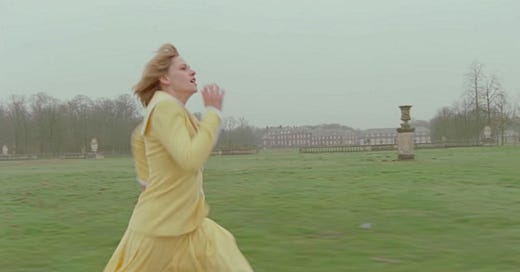Today, a short essay that I wrote appeared in The Guardian’s film vertical, investigating women running in a slew of new films including Spencer, Licorice Pizza, The Worst Person in the World, and The Souvenir Part II. This is my most *high-profile* publication to date and I am really proud of it — you can read the piece here. Special thanks to all who contributed suggested readings and research!
Due to the 1000 word limit and my exclusive focus on 2021-22 films, there is however a lot that didn’t make it into the piece. Movement is intensely political, and to have to reduce that to a limited number of ‘timely’ examples narrows the ways in which those politics can be explored. My research and argument also came from a much longer project — namely, my MA ‘Major Research Paper’ last summer that clocked in at 29,000+ words. As such, there is a lot more to be said about the politics and possibilities of cinematic movement and its relationship to gender, but also to issues of race, class, sexuality, and disability, which I was only able to gesture to here, but that were nonetheless essential to my original project from which the idea for this article arose. This includes the tactical deployment of a wide variety of bodily movement, and also of stillness as a means of resisting conscripted performances of identity and/or bodily labour. Also, women have obviously been moving or running onscreen for generations — part of the impetus of the piece was to focus on how that has converged with feminist projects in hyper-current films.
To keep the conversation going, I have put together the first ever No Outlet syllabus — think a more list-y version of the ones that Bookforum publish every so often. Anybody interested in further reading on movement in film, but also movement in literature, performance, politics, and social life, please read on and enjoy. These range from film studies, to literature, to philosophy, and everything in between, so hopefully there is something here for everyone interested. This list is also very much non-exhaustive and there are some books I have yet to crack open but hope to do so soon, such as this one and this one. I have also recently done some work on the history of related things like poses and posture through a postcolonial feminist lens, and other related projects, so these ideas continue to expand for me and I’m excited to hear what you all think.
Articles & Essays
Alessendra Raengo, “Blackness and the Image of Motility: A Suspenseful Critique” (see related*)
Kemi Adeyemi, “Beyond 90°: The Angularities of Black/Queer/Women/Lean”*
Iris Marion Young, “Throwing like a Girl: A Phenomenology of Feminine Body Comportment Motility and Spatiality”* (see summary also*)
Richard Dyer, “Action!”
Jenny Chamarette, “Overturning Feminist Phenomenologies: Disability, Complex Embodiment, Intersectionality, and Film”*
Rizvanna Bradley, “Black Cinematic Gesture and the Aesthetics of Contagion”
Sara Ahmed, “The Affective Politics of Fear” in The Cultural Politics of Emotion
Books on Film
Katharina Lindner, Film Bodies: Queer Feminist Encounters with Gender and Sexuality in Cinema
Elena Del Rio, Deleuze and the Cinemas of Performance: Powers of Affection
Laura U. Marks, The Skin of the Film: Intercultural Cinema, Embodiment, and the Senses (Introduction free*)
Erin Brannigan, Dancefilm: Choreography and the Moving Image
Other Theory Books
Sarah Jane Cervenak, Wandering: Philosophical Performances of Racial and Sexual Freedom (Introduction free*)
Erin Manning, The Minor Gesture (Introduction free*)
Saidiya Hartman, Scenes of Subjection: Terror, Slavery, and Self-Making in Nineteenth-Century America
Gayle Salamon, The Life and Death of Latisha King: A Critical Phenomenology of Transphobia
Katherine McKittrick, Demonic Grounds: Black Women And The Cartographies Of Struggle
Michel De Certeau, The Practice of Everyday Life
General Non-Fiction
Olivia Laing, Everybody: A Book About Freedom
Rebecca Solnit, Wanderlust: A History of Walking
*Publicly readable (not paywalled or limited to institutional access)





